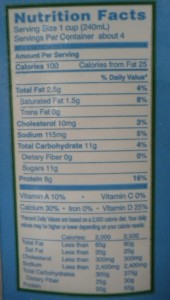Goat Milk? Are You “Kidding” Me?
Get it? Goat milk – kid-ding? Sorry, I couldn’t resist the pun. Anyway, the subject of goat’s milk as a substitute for cow’s milk has been getting some press lately in both consumer and trade publications so I thought I would do some investigation and see what all the hype was about.
As it’s important to compare nutritional information, I went to our local Whole Foods and bought a quart of Meyenberg low-fat goat’s milk and a half-gallon of Whole Foods’ 365 brand low-fat cow’s milk. Both are free from antibiotics and recombinant bovine growth hormone (rBGH), a synthetic (man-made) hormone that is marketed to dairy farmers to increase milk production in cows. According to the Meyenberg web site, their low-fat goat’s milk is higher in calcium, Vitamins A and B, and potassium than cow’s milk. However, if you review their nutritional label and compare it to the 365 cow’s milk, those claims do not stand up.
Here is a nutritional comparison of the two products:
-
Goat’s milk has fewer Calories but more Calories from Fat
-
They are equal in Total Fat and Saturated Fat and contain no Trans Fat
-
Goat’s milk has less Cholesterol and Sodium
-
Goat’s milk contains no Potassium while cow’s milk has 13% of the Daily Value
-
Goat’s milk has less Total Carbohydrates and Sugar
-
Cow’s milk has 27% more Protein (11g v. 8g)
With regard to Vitamins and Minerals:
-
They have identical amounts of Vitamins A and D
-
Cow’s milk has 2% Vitamin C and goat’s milk has 0%
-
Cow’s milk has 25% more Calcium than goat’s milk (40% vs. 30%)
According to supergoat.org, a consumer web site created by goat milk producers, goat’s milk has 15% more calcium and more Vitamin A and D, potassium, copper and manganese than cow’s milk. Perhaps this is true with other brands of goat’s milk, but this one has no copper or manganese and has less calcium than cow’s milk. I checked the goat’s milk against another brand (AltaDena) of low-fat cow’s milk and found similar results. The nutritional claims just don’t add up.
Please know that I am not trying to bash the goat milk industry. Goat’s milk may have some benefits over cow’s milk, especially for some people who are lactose intolerant as goat’s milk has been found to be easier to digest.
From an environmental perspective goats have a much smaller carbon “hoof” print as they don’t require as much energy, food or land as cows and produce far fewer greenhouse gases. Goats are also humanely treated as they are raised on family farms instead of factory farms. Plus, goats provide a valuable service—brush control. Here in Laguna Beach, as well as other parts of Southern California that are prone to brush fires, goats are used to eradicate brush from hillsides. In Laguna they are a sort of mini tourist attraction when they are feeding on the hills closest to town. It is fun to look up on the hill and see a herd of goats doing their “job”.
So what does goat milk taste like? Well, it tastes a lot like cow’s milk. A little different, but not bad. On cereal I could hardly taste the difference. Some of the KeepWell team said it tasted a bit like goat cheese, which makes sense. I also tried Redwood Hill Farm’s goat milk yogurt. The consistency was a little thinner than I was used to, but it was still tasty.
While I am disappointed with some of the results of my “investigation”, I’m happy to have tried, and learned, something new.



Recent Comments